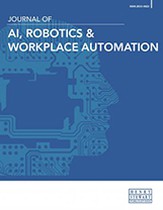Challenges and opportunities of quantum computing and its transformative potential to revolutionise various sectors and industries
Abstract
Quantum computing, leveraging the principles of quantum mechanics, is emerging as one of the most transformative technologies of the 21st century, promising computational power that can tackle problems once considered unsolvable. Unlike classical computing, which processes data in bits, quantum computing operates using quantum bits or ‘qubits’ that exploit quantum superposition and entanglement, enabling vastly superior processing power. This paper examines the challenges and opportunities presented by quantum computing, focusing on its potential to transform various industries such as healthcare, finance, education, defence, utilities and more. Additionally, the paper explores its environmental implications and impact on sustainability. A literature survey of key research contributions and a discussion of commercial timelines highlight the current state and future of this revolutionary technology. While quantum computing presents immense opportunities, its technical and economic challenges must be overcome for it to reach widespread commercial adoption. The paper concludes with an exploration of the road ahead for this nascent technology. Despite significant challenges, quantum computing offers unprecedented opportunities to transform multiple sectors, making it an essential area for ongoing research.
The full article is available to subscribers to the journal.
Author's Biography
Ravinder Singh Dr Ravinder Singh has a successful background in digital consulting/transformation, artificial intelligence/machine learning (AI/ML), generative AI/large language models (GenAI/LLMs), Internet of Things (IoT), emerging technologies and innovations, enterprise architecture, sustainability, standards, assurance and audits, cyber and information security, programme/project management with budgets up to £1.5bn. His broad ‘C-level’ experience encompasses both public and private sectors, including the World Bank, UK Government, governments of Switzerland, Thailand, Colombia, Ukraine, Rwanda, India and others, defence, Big-4 consulting, banking, financial services and insurance (BFSI), software houses, research and development (R&D), telecom and oil/utility sectors. Ravinder holds two Copyrights of Software, has published 14 research papers, and was nominated for the Shri Dewang Mehta National Award for Innovation in Information Technology, India. He is listed in Who’s Who in the World 2014–16 and 2018–20 (31st and 32nd editions) and Who’s Who in Asia 2006 and 2012 (1st and 2nd editions). Ravinder is the co-author of Model Driven Business Process Engineering (2014), an accredited IPA reviewer, certified PMP, Prince-2, ITIL, Lead Auditor-ISO 27001, CMMI, ISO 9001. His academic roles include editor of PG, UG and Certificate course material, Board of Studies member, curriculum design and visiting faculty to various universities and colleges.
